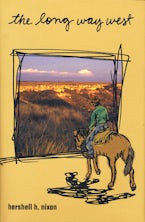A tale of westering, high in adventure and long on character
The Old West and westering are an American story—even when the story winds up in New York and the hero is only seventeen.
Lured by the promise of rich Oregon farmland and intent on his independence from an overbearing father, young George Wendt heads west. His journey is interrupted, however, when at the foot of the Bighorn Mountains he encounters Woody, a tired old mountain man who needs help. George promises that help, but his best is not enough. After Woody’s death, George reluctantly forsakes his own dreams and turns back east to bring Woody’s sister not only the gold his elderly friend has saved and hidden away but—more importantly—the stories of Woody’s life.
George’s trip is anything but easy, as he must grapple with one difficulty after another. Woody’s long-time enemy, a fellow mountain man who knows about the gold, presents the greatest danger as he tracks George, using all his wiles and trickery to challenge him, even threatening Woody’s family. But George, true to his promise to Woody and to himself, is determined to win.
The story of the American West and particularly the Oregon Trail belongs to all Americans. The sheer number of Americans who became part of the story means it can be no less than mythic. Yet many of those passages west began and ended east of the Missouri. The Long Way West, illustrative of countless real experiences, proves that Western heroism cannot be defined by the map.

